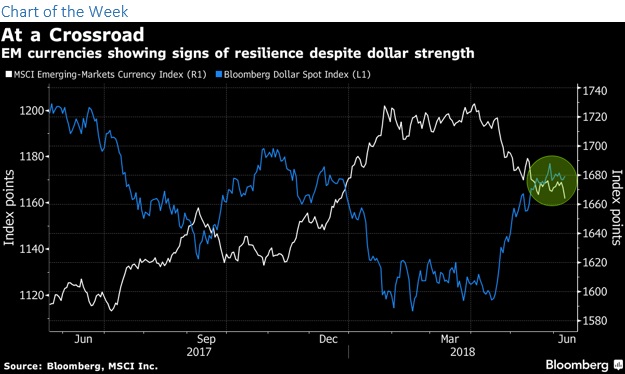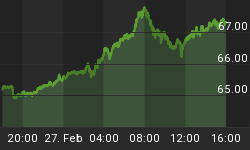Monday, June 11, 2018
Trump attacks close allies, tests trade alliance. Seven decades of U.S.-led trade order is being tested by Donald Trump, who continues to verbally attack Canada and the European Union. The most contentious meeting of industrialized nations took place in Quebec over the last few days, with President Trump not endorsing the communique from the summit. He then took to Twitter to attack Canadian Prime Minister Justin Trudeau shortly after he departed for Singapore to meet with North Korean dictator Kim Jong Un. Worryingly, he threatened to impose new tariffs on imported automobiles, which would amount to a significant escalation. Still, the markets seem unmoved by the turmoil, with stocks up modestly in early trading on Monday.

(Click to enlarge)
- Emerging market currencies have been hit hard in the past few weeks as the Fed rate tightening continues to be felt across the globe.
- Turkey and India recently hiked interest rates to arrest the decline of their currencies.
- But Brazil has been in focus recently, with the country’s currency plunging by more than 15 percent over a three-day period last week.
- The currency regained much of that lost ground after Brazil’s central bank stepped in to halt the losses. “All instruments are valid,” Central Bank President Ilan Goldfajn said, adding “if there is demand, we may use reserves.”
Markets
Western-led economic system fraying. President Trump’s refusal to endorse the G7 communique startled the leaders of the other six nations, and foreshadow more trouble between the U.S. and its closest allies. In the next few weeks, the Trump administration will have to make several consequential decisions on the NAFTA renegotiation, tariffs on China, and how to proceed with trade fights with Canada, Mexico and the EU. Also, the NATO summit is scheduled for mid-July. To complicate matters, these issues are interrelated – analysts believe Trump will need the EU and others on board for a trade fight with China, for example, while Trump’s hostile treatment of close allies weakens his hand in those negotiations. Related: Are Smart Home Devices Spying On Us?
EU vows trade retaliation. In a highly unusual position and tone, German Chancellor Angela Merkel promised to fight back against U.S. tariffs. “So we won’t let ourselves be ripped off again and again. Instead, we act then too,” Merkel said. The next stage of the escalating trade war is potential U.S. tariffs on imported automobiles, something that President Trump said he was considering. “First of all, we’ll try and see if we can prevent this... And then hope that the EU will respond again in the same unity,” Merkel told reporters in response to that prospect. For more than a year, EU officials have been trying to accommodate the Trump administration on a variety of key issues, but the comments from the German Chancellor suggest a shift in strategy.
Argentina reaches bailout deal with IMF. The IMF and Argentina signed a $50 billion financing deal, which will stretch over three years. The move comes after capital flight from the South American nation led to a sharp decline in the value of the peso. The arrangement is a standby financing deal, and Argentina’s Treasury Minister said that the government will likely immediately tap 30 percent of the funding, or $15 billion.
Commodities
Cobalt prices sink 20 percent. After more than two years of sharp gains, cobalt prices tumbled over the past two months, falling last week to their lowest level since January. Cobalt sulfate prices are down more than 20 percent since peaking in April. The sharp price increases in the past few years were the result of a run up in demand for batteries used in electric vehicles and bullish forecasts for EV adoption led to expectations of tight cobalt supply for years to come. However, a recent slowdown in purchases by battery makers have eased concerns about adequate cobalt supplies, causing prices to fall back.
Gold shrugs off G7 instability, looks to Singapore. Gold prices showed “virtually no reaction to the bombshell at the weekend’s G7 summit in Canada,” Commerzbank said in a note. “Market participants are already looking ahead: tomorrow will see U.S. President Donald Trump and North Korean leader Kim Jong-un meet in Singapore. If agreement were to be reached there, geopolitical risks in the region would probably decrease, resulting in less demand for gold as a safe haven.” With that said, the U.S. Fed and the European Central Bank both meet this week, and the ECB could potentially announce the end of its expansionary monetary policy.
China seeks to expand influence over commodity trading. China made a lot of news when it launched a new oil futures contract denominated in yuan on the Shanghai International Energy Exchange earlier this year, but that is just part of a broader strategy to gain more influence over global commodity markets, according to CNBC. China also opened up exchanges and derivatives trading for iron ore on the Dalian Commodity Exchange and for palm oil on the Asia Pacific Exchange. “Despite a host of concerns, the Chinese are betting that the country's large trading base will create a new market with strong liquidity, eventually attracting international players, and establishing new global benchmarks,” CNBC wrote.
Energy
UK creates regulatory carve out to attract Aramco IPO. The UK securities regulator adopted rules last week that are widely seen as an attempt to convince Saudi Aramco to list its shares in London. The Financial Conduct Authority created a new listing category that allows Aramco and other state-owned companies to list their shares on the London Stock Exchange while not having to comply with certain procedures intended to protect public minority shareholders, according to the WSJ. Saudi officials are reportedly weighing a listing in New York, London or Hong Kong. Related: Emerging Currencies Struggle To Gain Footing
U.S. natural gas exports jump 8 percent. U.S. natural gas exports were up 8 percent in the first quarter compared to the same period in 2017. The U.S. averaged 9.6 billion cubic feet per day in the first three months of the year. Also, the U.S. became a net exporter of natural gas last year for the first time since 1957.
Russia, Saudi Arabia start slowly increasing output. With the OPEC meeting quickly approaching, recent data suggests that the two most powerful producers are already starting to hike production. Russian output ticked up to 11.1 million barrels per day in the first week of June, up from their 10.95 mb/d limit. Also, Saudi Arabia increased production by 100,000 bpd in May, a notable shift for the country after consistently keeping output well below what was required in order to accelerate the oil market rebalancing. Taken together, the figures demonstrate the clearest sign yet that the two oil producers could agree to increase production at the upcoming meeting.
Cryptocurrencies
Bitcoin prices plunge 10 percent. Over the weekend, a hack on a South Korean cryptocurrency exchange caused prices of digital currencies to plunge. Bitcoin fell 10 percent on the news, hitting its lowest level in two months. South Korean exchange Coinrail said the “cyber intrusion” resulted in the theft of more than 30 percent of the coins on traded on the exchange. Separately, a group of hackers reportedly stole more than USD$20 million worth of Ethereum from apps and mining rigs, according to Chinese cyber-security firm Qihoo 360 Netlab.
$2.3 billion in losses for cryptocurrencies from hacks. Digital currencies have been under fire from both hackers and regulators, causing sharp selloffs. According to CyrptoAware, hackers have caused losses of around $2.3 billion, most of which is incurred by customers who are often unable to regain control of their stolen digital currencies.
Binance says cryptos can convert to fiat currencies. Binance, one of the largest cryptocurrency exchanges, announced that traders will soon be able to convert their digital currencies into fiat currencies such as the euro. Most exchanges only offer crypto-to-crypto trading to avoid regulatory risk, but that also curbs the upside for traders who might want to cash out.
By Josh Owens for Safehaven.com
More Top Reads From Safehaven.com:
















